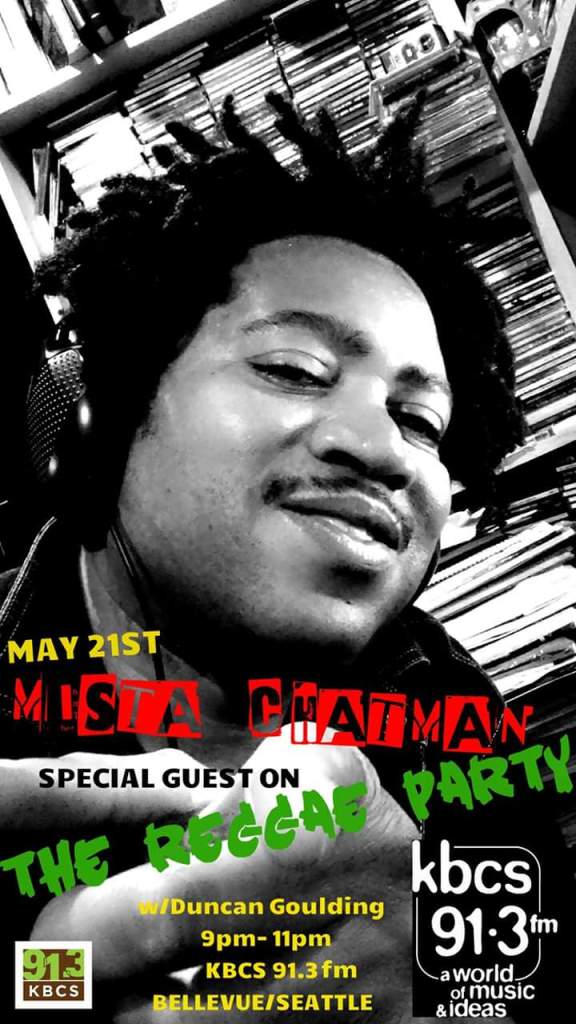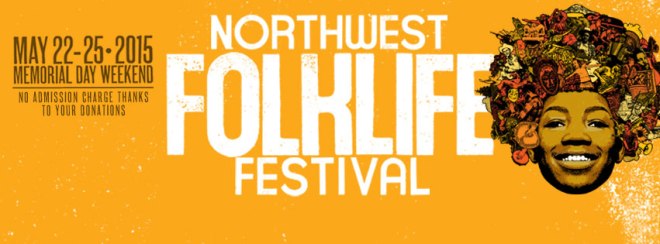These pics and clips are from last week’s interview and performance by #Reggae artist @clintonfearon for the upcoming #FolkLife50 celebration. It was a great time!! The @nwfolklife festival will be presented online this year with the remainder of the Reggae artists submitting pre recorded videos and performances. Up & coming Jamaican born Dancehall artist BLACK PUMA and long time Jamaican transplant SELASSIE I SOLDIER will also be featured. Stay tuned for the full lineup and info on how to view.. BLESS!! 🇺🇲🇯🇲♥️💛💚🖤 #ReggaeRising #NWFolklife #Seattle #SeattleReggae #SeattleRoots
Reggae Rising Stage
May 21st- MISTA CHATMAN Live on THE REGGAE PARTY- KBCS 91.3 fm
This Thursday, May 21st at 9pm, tune into KBCS 91.3 fm outta Bellevue/Seattle to hear MISTA CHATMAN interview with Duncan Goulding on THE REGGAE PARTY. One topic we’ll be discussing is the REGGAE RISING STAGE coming to Northwest Folklife next Monday, May 25th at 6pm. We’ll be playing songs from each of the artists on the stage as well as Chatman demonstrating some live “Freestyle” Reggae Dancehall toasting on air…definitely a Reggae party in Session!! If you can’t tune in on your radio dial, you can check it online at: http://kbcs.fm/ So TUNE IN AND TUNN UPP!!
REGGAE RISING: HIP HOP’S ROOTS IN REGGAE MUSIC- NWFOLKLIFE 2015
Check out my article for Folklife 2015. Underneath you can find a link to the article…
REGGAE RISING: HIP HOP’S ROOTS IN REGGAE MUSIC
Reggae has been at the forefront in the development of music for many years now. From Electronic Dance Music to Pop to Punk to Disco and several other music genres today, you can hear the influence of Reggae coming from their core. And one genre of music in particular that is directly influenced from Reggae is HIP HOP. Those familiar with Hip Hop’s history know that the culture was started in the late 70’s in the Bronx, NYC. The founding fathers of the culture are Afrika Bambatta, Grandmaster Flash and DJ Kool Herc. DJ Kool Herc being a native of Kingston, Jamaica always credits his Jamaican roots for his early techniques and development of the culture.
Reggae music’s traditions of dubbing out tracks and toasting on the microphone are a direct lead in to hip hop’s sampling & emceeing (now known as rapping). In Jamaica, Dubbing out a track was the same as making a instrumental remix of a original song. It would usually be the B-side of a Jamaican 7″ single with the original song being the A- side. It involves stripping away most of the instrumentation of the song, vocals and melody highlighting the heavy drums & bassline. This would allow for a artist to “toast” or chat live on top the beat in the same way a Hip Hop emcee can freestyle over the instrumental of their favorite track. And well known Jamaican Dub architect Lee Scratch Perry created the idea of putting sound effects such as babies crying, gunshots, breaking glass, etc. into his dubs and tracks thus inventing sampling. So as you see, elements of Hip Hop can be traced back to techniques that came from Jamaican studios years earlier.
Originally, early DJs in Jamaica would get on the microphone just to promote albums or hype up tracks. Foundation Dancehall artist Daddy U-Roy was one of the first artists to actually toast phrases that fit in with the words of the song in addition to his call and response style and exclamations of “Wow” & Yeah”. This style is where rapping draws its roots from. Back in the Bronx, a emcee by the name of Coke La Rock worked alongside DJ Kool Herc hyping up crowds in the style reminicant of the Jamaican Sound System toasting style. He didn’t do full on lyrical flows like rappers today, but he would hype up the crowd with party motivating slogans like “To tha beat y’all!” or “Rock on My Mellow!”. Many old school listeners refer to him as the first Hip Hop emcee.
From the late 70’s and into 80’s, the toasting style in Jamaica progressed and more toasters (also known as Dee-Jays) such as Ranking Joe, Charlie Chaplin, Yellowman and Eek A Mouse appeared on the scene with a more lyrical rhyming style. They would record songs on top of sparse riddims (instrumental tracks) made from various producers like Junjo Lawes, Linval Thompson, Gussie Clarke & Jah Thomas thus creating the Dancehall style. During this time, Dee-Jay records became more important than the Roots Reggae sound which had dominated Jamaica for the majority of the 70’s. Another popular trend in this time was the soundclash. Soundclashes featured rival Dee-Jays and Soundsystems who would compete head to head in front of live crowds to showcase who had the biggest & toughest sound. This trend also directly influenced Hip Hop in the US as Breakdancers & Emcees from different crews would have Challenge competitions to display who had the best skills on the mic or on the floor with their breakdance moves. This allowed the youth to focus their skills on something other than the every day violence that came with living in the inner cities. Both African Americans and Jamaicans alike could relate to the social and economic hardships they faced daily.
The late 80’s and throughout the 90’s were important years in regards to Reggae and Hip Hop crossing paths in the United States. There were several Hip Hop artists coming out during this time such as: Boogie Down Productions, Poor Righteous Teachers, Just-Ice, Heavy-D & Jamalski who were spicing up their beats & rhymes with the Reggae flavor. This was also the time that many Jamaican Dancehall acts such as Shabba Ranks, Super Cat, Cutty Ranks, Buju Banton & Mad Cobra were getting record deals on American labels and starting to collaborate with US Hip Hop artists. This era also birthed the very popular Reggae/Hip Hop remix trend. That was when a producer would take the acapella (lyrics) of a popular Reggae Dancehall song and place them on top of a popular Hip Hop or R&B instrumental. Nowadays this style is referred to as a “mashup”.
Although the Reggae/Hip Hop crossover style was more dominant on the east coast in NYC, the west coast has had it’s share of artists who have been experimenting with that flavor for many years. One artist in particular is MISTA CHATMAN (formerly know as DJ Collage). Chatman has spent several years visiting and performing on both coasts taking in the flavor. In fact, he is currently working on a mixtape titled “Chat Down Memory Lane” in which he will be performing Reggae Dancehall lyrics over popular old skool Hip Hop and R&B beats revisiting the remix vibe that was popular in the 90’s.
You can check out MISTA CHATMAN live & direct on this years Reggae Rising stage along with Seattle based Organic Hip Hop Reggae crew INDIGITIZE, Eugene based Hip Hop/Soul/Reggae outfit THE ELENA LEONA PROJECT, Seattle based 80’s style Reggae band DIGITAL LION with guest Jamaican born MC SELASSIE I SOLDIER on the mic and Seattle’s top foundation Reggae artist CLINTON FEARON & THE BOOGIE BROWN BAND returning to nice up the lawn. Time to get irie..BO! BO! BO!



